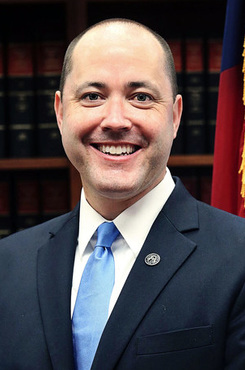AG Carr Hits Back at Abortion Ban Challenge
“Defendants deny all allegations in the complaint that killing a living unborn child constitutes ‘medical care’ or ‘health care',” Attorney General Chris Carr and his team said.
August 20, 2019 at 11:08 AM
7 minute read
 Georgia Attorney General Chris Carr (Courtesy photo)
Georgia Attorney General Chris Carr (Courtesy photo)The battle over Georgia’s new abortion ban picked up late Monday, with Attorney General Chris Carr filing the state’s answer to a lawsuit seeking to stop enforcement before the Jan. 1 effective date.
“Defendants admit that this action is a constitutional challenge to House Bill 481 (“H.B. 481”), the text of which speaks for itself,” Carr’s answer began. “Defendants deny all allegations in the complaint that killing a living unborn child constitutes ‘medical care’ or ‘health care.’”
The defendants include Gov. Brian Kemp, Carr, prosecutors around the state and members of the Georgia Composite Medical Board and the commissioner of the Department of Public Health.
 Andrew Pinson, solicitor general, state of Georgia (Courtesy photo)
Andrew Pinson, solicitor general, state of Georgia (Courtesy photo)In the state’s first two pleadings, Carr and his team referred repeatedly to an embryo as a child and a pregnant woman as a mother—even in the earliest stage of pregnancy.
Carr argued that the state has “interests in protecting the life of the unborn; promoting respect for life at all stages of pregnancy; protecting maternal health and safety; and safeguarding the ethics and integrity of the medical profession.”
Carr also brought up the familiar sovereign immunity defense, asserting the state can’t be sued.
 Jeffrey M. Harris (Photo: Diego M. Radzinschi/ALM)
Jeffrey M. Harris (Photo: Diego M. Radzinschi/ALM)Defense counsel listed on the answer include Carr as well as Georgia Solicitor General Andrew Pinson and Washington appellate lawyer Jeffrey M. Harris of Consovoy McCarthy. Carr has retained Harris as a special assistant attorney general for the abortion ban litigation.
SisterSong Women of Color Reproductive Justice Collective is the lead plaintiff. It’s a Georgia-based nonprofit organization formed in 1997 by 16 groups led by and representing indigenous, black, Latinx and Asian American women, as well as trans people. The other plaintiffs include Feminist Women’s Health Center of DeKalb County, Planned Parenthood Southeast, other medical facilities around the state and physicians and staff suing on behalf of themselves and their patients.
The plaintiffs are being represented by lawyers with the American Civil Liberties Union in Atlanta and New York and with Planned Parenthood in Washington and New York.
“We will respond in a filing to the court,” ACLU Georgia Legal Director Sean J. Young said Monday evening.
Separately from the 16-page answer, the state filed a 27-page response in opposition to SisterSong’s motion for a preliminary injunction to block enforcement of the ban while the litigation proceeds. The response brief also asserted a state interest in protecting the “life of the unborn,” citing Gonzales v. Carhart, 550 U.S. 124, 145, 158 (2007).
“The state, from the inception of the pregnancy, maintains its own regulatory interest in protecting the life of the fetus that may become a child,” Carr said, quoting Gonzales.
Carr also cited Planned Parenthood of S.E. Pennsylvania v. Casey, 505 U.S. 833, 870 (1992). That landmark case held that the government could not place undue burdens on a woman’s ability to seek an abortion, affirming the determination in Roe v. Wade that a woman has a constitutional right to choose whether to continue a pregnancy before the time of viability, when a baby could survive on its own with medical intervention.
Carr quoted Casey saying the state “has a legitimate interest in promoting the life or potential life of the unborn.”
“Moreover, it is well-settled that ‘a fetus is a living organism within the womb, whether or not it is viable outside the womb,’” Carr continued, switching back to Gonzales. “Accordingly, a state may properly recognize that an unborn child is alive even before ‘viability’ and— consistent with its power to protect unborn life—may prohibit the killing of that child by restricting certain types of pre-viability abortions.”
The state’s pleadings use the name the sponsors gave HB 481—the Living Infants Fairness and Equality Act (“LIFE Act”). The act prohibits abortions after the detection of a “fetal heartbeat”—a term in dispute as the other side argues that an embryonic pulsing heard on an ultrasound is not a heartbeat, since no heart has developed in the pea-sized embryo at that point. Even the timing of that point is in dispute. Opponents put it at six weeks of pregnancy—four weeks after conception. The state’s answer quotes the bill lead sponsor, Rep. Ed Setzler, R-Acworth), saying it could be longer, possibly eight to 12 weeks.
“The act’s primary objective is to advance Georgia’s interest in protecting the life of the unborn, an objective the act pursues through restrictions on abortion, as well as other tax and child support provisions designed to promote the well-being of unborn children,” Carr said. The bill provides for fetal and embryonic child support and tax deductions. It also includes criminal penalties and affirmative defenses for women and doctors in some cases. The exceptions to the ban includes cases of rape and incest—if an “official police report has been filed,” but only up to 20 weeks of pregnancy—and medical emergencies when a doctor determines the mother’s life is at risk.
Carr’s answer also takes issue with the term ban, noting those exceptions. The attorney general’s answer also asserts that the state has an interest in encouraging women to “choose childbirth instead of abortion.”
The state’s opposition brief emphasized what the sponsors of the bill expressed hope will be its ticket to the U.S. Supreme Court to challenge Roe.
“The LIFE Act seeks to advance a critical government interest in protecting unborn human life in a context that has not been squarely addressed by the Supreme Court,” Carr said. “Given that the law in this area remains unsettled, Plaintiffs cannot demonstrate a substantial likelihood of success on the merits.”
Carr’s brief in opposition to the motion for preliminary injunction reflects the assertions of Setzler and other sponsors of the bill that prohibiting abortion after the detection of a so-called heartbeat makes sense because most miscarriages happen before that point.
“Georgia’s decision to draw a line at the heartbeat is substantially related to its important interest in protecting life because the heartbeat is an extremely accurate indicator that an unborn child will survive until birth,” Carr said. “In short, once a heartbeat is detected, it is almost certain that an unborn child will survive to birth absent affirmative interventions to take away its life.”
The state took issue with SisterSong for waiting two months from the bill’s passage to file the lawsuit and at the same time argued that an injunction is unnecessary.
“The LIFE Act does not go into effect until Jan. 1, 2020, and there is thus sufficient time for this case to be adjudicated on the merits before any alleged harm to plaintiffs could materialize. Because most of the issues in this case turn on pure questions of law—such as how the state may legitimately advance its interests and what standard of review applies— Georgia will use a limited number of fact and/or expert witnesses,” Carr said. “With more than four months before the LIFE Act takes effect, the state believes that there is ample time to resolve this entire case through a joint hearing on the merits and the preliminary injunction motion in October or November.”
The state added that, if Judge Steve Jones ‘believes there is not enough time to reach a decision on the merits before the end of the year, it is largely the product of plaintiffs’ own lack of urgency in litigating this case.”
The case is SisterSong v. Kemp, No. 1:19-cv-02973-SCJ.
This content has been archived. It is available through our partners, LexisNexis® and Bloomberg Law.
To view this content, please continue to their sites.
Not a Lexis Subscriber?
Subscribe Now
Not a Bloomberg Law Subscriber?
Subscribe Now
NOT FOR REPRINT
© 2025 ALM Global, LLC, All Rights Reserved. Request academic re-use from www.copyright.com. All other uses, submit a request to [email protected]. For more information visit Asset & Logo Licensing.
You Might Like
View All
Transgender Care Fight Targets More Adults as Georgia, Other States Weigh Laws

Georgia Republicans Push to Limit Lawsuits. But Would That Keep Insurance Rates From Rising?
5 minute read
A Plan Is Brewing to Limit Big-Dollar Suits in Georgia—and Lawyers Have Mixed Feelings
10 minute readTrending Stories
- 1Will Big Law's Bet on the Middle East Pay Off?
- 2Jury Awards $3M in Shooting at Nightclub
- 3How Clean Is the Clean Slate Act?
- 4Florida Bar Sues Miami Attorney for Frivolous Lawsuits
- 5Donald Trump Serves Only De Facto and Not De Jure: A Status That Voids His Acts Usurping the Power of Congress or the Courts
Who Got The Work
J. Brugh Lower of Gibbons has entered an appearance for industrial equipment supplier Devco Corporation in a pending trademark infringement lawsuit. The suit, accusing the defendant of selling knock-off Graco products, was filed Dec. 18 in New Jersey District Court by Rivkin Radler on behalf of Graco Inc. and Graco Minnesota. The case, assigned to U.S. District Judge Zahid N. Quraishi, is 3:24-cv-11294, Graco Inc. et al v. Devco Corporation.
Who Got The Work
Rebecca Maller-Stein and Kent A. Yalowitz of Arnold & Porter Kaye Scholer have entered their appearances for Hanaco Venture Capital and its executives, Lior Prosor and David Frankel, in a pending securities lawsuit. The action, filed on Dec. 24 in New York Southern District Court by Zell, Aron & Co. on behalf of Goldeneye Advisors, accuses the defendants of negligently and fraudulently managing the plaintiff's $1 million investment. The case, assigned to U.S. District Judge Vernon S. Broderick, is 1:24-cv-09918, Goldeneye Advisors, LLC v. Hanaco Venture Capital, Ltd. et al.
Who Got The Work
Attorneys from A&O Shearman has stepped in as defense counsel for Toronto-Dominion Bank and other defendants in a pending securities class action. The suit, filed Dec. 11 in New York Southern District Court by Bleichmar Fonti & Auld, accuses the defendants of concealing the bank's 'pervasive' deficiencies in regards to its compliance with the Bank Secrecy Act and the quality of its anti-money laundering controls. The case, assigned to U.S. District Judge Arun Subramanian, is 1:24-cv-09445, Gonzalez v. The Toronto-Dominion Bank et al.
Who Got The Work
Crown Castle International, a Pennsylvania company providing shared communications infrastructure, has turned to Luke D. Wolf of Gordon Rees Scully Mansukhani to fend off a pending breach-of-contract lawsuit. The court action, filed Nov. 25 in Michigan Eastern District Court by Hooper Hathaway PC on behalf of The Town Residences LLC, accuses Crown Castle of failing to transfer approximately $30,000 in utility payments from T-Mobile in breach of a roof-top lease and assignment agreement. The case, assigned to U.S. District Judge Susan K. Declercq, is 2:24-cv-13131, The Town Residences LLC v. T-Mobile US, Inc. et al.
Who Got The Work
Wilfred P. Coronato and Daniel M. Schwartz of McCarter & English have stepped in as defense counsel to Electrolux Home Products Inc. in a pending product liability lawsuit. The court action, filed Nov. 26 in New York Eastern District Court by Poulos Lopiccolo PC and Nagel Rice LLP on behalf of David Stern, alleges that the defendant's refrigerators’ drawers and shelving repeatedly break and fall apart within months after purchase. The case, assigned to U.S. District Judge Joan M. Azrack, is 2:24-cv-08204, Stern v. Electrolux Home Products, Inc.
Featured Firms
Law Offices of Gary Martin Hays & Associates, P.C.
(470) 294-1674
Law Offices of Mark E. Salomone
(857) 444-6468
Smith & Hassler
(713) 739-1250







